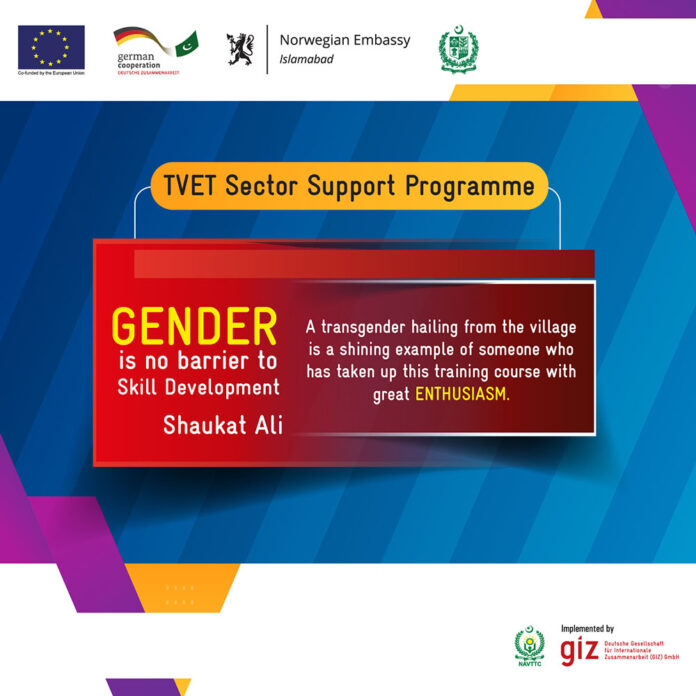Pakistan’s transgender community has remained outside the formal employment sector for decades. Neglect of the social and economic needs of transgender people has resulted in their exclusion from mainstream society. Most transgenders have limited opportunities to work and end up as performers or resort to begging to make a living. This neither gives them dignity nor financial security and continues the cycle of discrimination and isolation for them.
Discrimination and stigma pose the biggest challenge for this community to access employment or other legal livelihood options.
Located at a distance of around 70 kilometers from Punjab’s regional headquarter Lahore, the district of Chunian has a large populace of transgenders. In a startling move, the Vocational Training Institute (VTI), Chunian announced a training course on industrial garments stitching with the support of TVET Sector Support Programme, funded by EU, Norway and Germany, exclusively for transgenders.
Being part of a marginalised segment of society, left to live on their own, the transgenders were overjoyed to know that somebody cared enough to lend a helping hand. But despite the excitement, it was not an easy task to convince the transgender community to enroll themselves in the class. The objective of this programme is to bring the transgender community into the mainstream of society and provide them with opportunities for self-employment.
“It took exhaustive sessions with their gurus (leaders of transgenders) to make them realise the utility of the training programme,” says Abdur Rehman, the principal of VTI Chunian. He explains that the ultimate goal of this programme is to train and enable transgenders to find jobs and that too in a high-demand profession such as industrial garments stitching.
Shaukat Ali is a shining example of someone who has taken up this training course with great enthusiasm. A transgender hailing from the village of Nathoki, Kot Radha Kishan, District Kasur, she was just 10 when signs of a change of gender began to appear in her body, and her parent’s attitude towards her changed.
Today, having learned to work on five different stitching machines, she says she can stitch dresses for both men and women. She is a step ahead of many others in the class as she is already running a small stitching center in her house and earning a healthy income. She is committed to this skill development initiative and hopes she will be able to make a living.
As a transgender, life has never been easy for Shaukat Ali. The social stigma and obstacles she has faced made every step of her life difficult, but she never gave up. She was determined to create an identity for her own community in society.
She is working toward a society in which people regardless of their identity will have equal access to skill training and other life opportunities.
Today, Shaukat Ali is very happy to have found a light at the end of the tunnel.
“Appreciate hard times someday they’ll just be another chapter of your story”.


